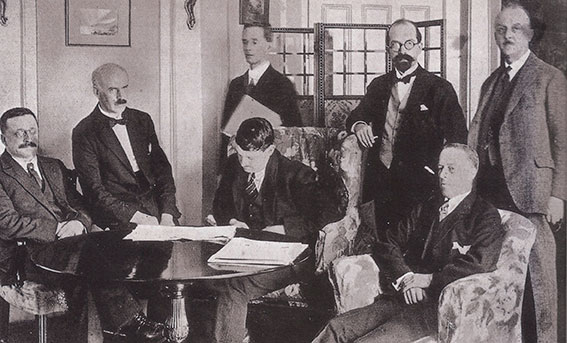Plenipotentiaries appointed
Published in Issue 5 (September/October 2021), Volume 29By Joseph E.A. Connell
In September 1921 Eamon de Valera wrote to Prime Minister Lloyd George, confirming that a conference was to be set to negotiate a Treaty:
‘Our respective positions have been stated and are understood and we agree that conference, not correspondence, is the most practical and hopeful way to an understanding. We accept the invitation, and our Delegates will meet you in London.’
On 7 October letters were issued to the plenipotentiaries:
‘TO ALL WHOM THESE PRESENTS COME, GREETING:
In virtue of the authority vested in me by Dáil Éireann, I hereby appoint
Arthur Griffith, TD, Minister for Foreign Affairs, Chairm.
Michael Collins, TD, Minister for Finance
Robert C. Barton, TD, Minister for Economic Affairs
Edmund J. Duggan, TD
George Gavan-Duffy, TD
As Envoys Plenipotentiary from the Elected Government of the REPUBLIC OF IRELAND to negotiate and conclude on behalf of Ireland with the representatives of his Britannic Majesty, GEORGE V, a Treaty or Treaties of Settlement, Association, and Accommodation between Ireland and the community of nations known as the British Commonwealth.
IN WITNESS WHEREOF I hereunto subscribe my name as President.
[signed] Eamon de Valera’
It is important to note the diplomatic meaning of the title ‘plenipotentiary’. The word (from the Latin plenus + potens, full + power) has two meanings. As a noun, it refers to a person who has ‘full powers’ to negotiate. In particular, the term commonly refers to a person appointed by his/her government who is fully authorised to represent that government. As an adjective, plenipotentiary refers to that which confers ‘full powers’.
While de Valera was not prepared to lead the delegation in London, this did not stop his attempt to direct events from Dublin. Accordingly, he drew up the following document of instructions that he circulated to them:
‘(1) The Plenipotentiaries have full powers as defined in their credentials.
(2) It is understood before decisions are finally reached on a main question, that a dispatch notifying the intention to make these decisions will be sent to members of the Cabinet in Dublin, and that a reply will be awaited by the Plenipotentiaries before final decision is made.
(3) It is also understood that the complete text of the draft treaty about to be signed will be similarly submitted to Dublin and a reply awaited.
(4) In case of a break the text of final proposals from our side will be similarly submitted.
(5) It is understood that the Cabinet in Dublin will be kept regularly informed of the progress of the negotiations.’

Above: The Irish plenipotentiaries in London—(seated, left to right) Arthur Griffith, Edmund J. Duggan, Michael Collins, Robert C. Barton, and (standing, centre) George Gavan-Duffy.
De Valera clearly intended that these ‘instructions’, particularly clauses 2 and 3, would enable him to veto any draft document that he considered unacceptable. It is also believed that these ‘instructions’ were formulated to placate Cathal Brugha and Austin Stack, much more doctrinaire and ideological than the Irish people, who were desperately anxious for a settlement. Griffith and Collins, for their part, were unhappy with the limitations, and they chose to ignore these further instructions, which had not been approved by the cabinet, considering them only as guiding principles, not mandatory.
There are contrasting views of these ‘instructions’. A rigid interpretation is not reconcilable with the plenipotentiary credentials. Since the Dáil had already conferred full plenipotentiary powers, the instructions from the cabinet, an inferior body, were not legally binding in any instance in which they limited the powers of the delegation. Brugha and Stack, however, viewed the ‘instructions’ as requiring the delegation in London to keep the cabinet in Dublin duly informed at every step and not to sign the final draft without submitting it to the cabinet and awaiting a reply.
The different interpretations of the powers vested in the ‘plenipotentiaries’ were debated at length after the signing of the Anglo-Irish Treaty—and continue to this day.
Joseph E.A. Connell Jr is the author of The shadow war: Michael Collins and the politics of violence (Eastwood Books).
















